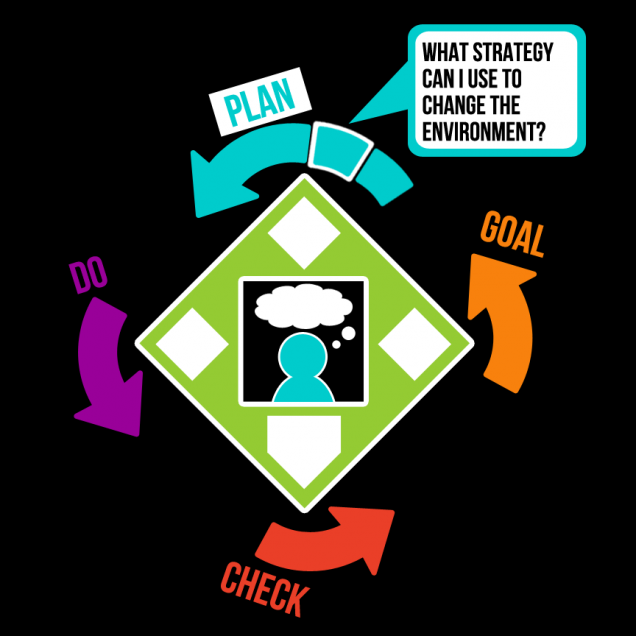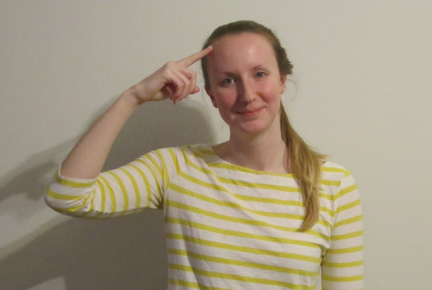Second Base: Plan Step 2
Contents
- Second Base: Plan Step 2 Introduction
- What is a Barrier?
- The 6 Strategies
- Second Base: Plan Step 2 Game Plan Worksheet
Second Base of the Game Plan is called Second Base: Plan. When we plan, we think of ways to meet our goal. Second Base: Plan has three steps, or three things we have to think about. The second step of Second Base is Plan: Step 2. During Plan: Step 2, we ask the question, “What strategy can I use to change the environment?”
Each base of the Game Plan has a hand motion to help us remember what it means. When we ask, “What strategy can I use to change the environment?,” we make this motion which represents that I am thinking of a strategy to make a change in the environment.
Another way to remember that Second Base: Plan Step 2, is by remembering the symbol. The symbol for Second Base: Plan Step 2 is a person thinking.

Now it’s time to ask yourself the Second Base: Plan Step 2 question: “What strategy can I use to change the environment?”
Remember, in Project TEAM, we use the word environment to describe the people, places, and things all around you. Sometimes different parts of the environment get in the way, or make it hard for us to do activities. In Project TEAM, we call parts of the environment that make it hard to do activities barriers.
A strategy is an idea that we can use to change the environment to make it easier to do the activities we want to do. Strategies are ways to change the part of the environment that is making it hard. Strategies can help us remove barriers or help us to work around barriers. In Project TEAM, we learn six strategies. The strategies are:
- Plan ahead: Before you start an activity, think about how you will do the activity. Get the things you need before you start an activity.
- Use technology or things: Use technology or things in different ways to do an activity. Use new technology or things to do an activity.
- Change spaces: Change the size, shape, and arrangement of indoor spaces, outdoor spaces, entrances and exits, or ground. Change the amount or type of light, sound, or smell in the space. Do the activity in a different place.
- Change the rules: Change the way you do an activity by changing the rules, amount of time, or order of steps.
- Ask someone for help: Find people who can give you information or help you solve a problem. Change the type or amount of help you get from other people during an activity.
- Teach others about abilities and needs: Tell other people what you can do. Tell other people about the type and amount of help you need to do an activity. Teach other people about your disability.
To learn more about the six strategies, download and look over the Strategies Slideshow. You can print this out to help you complete future Project TEAM activities.
What strategy can I use to change the environment?
In order to answer this question, we first have to remember the barriers, or the parts of the environment that make it hard for you to do the activity you want to do.
Download and print out the Second Base: Plan Step 2 Game Plan Worksheet. In the column on the left, you can write the names of the parts of the environment that are barriers in your activity goal. You can write up to three barriers on this worksheet; if you have four or more barriers, you will need to pick the three parts of the environment that you think make it the hardest to do the activity.
After you write the barriers, go to the next column where it says, “What strategy can I use?” Think of a strategy you can use to change each part of the environment. Check off the strategy you could use. Then, in the next column where it says, “Explain your strategy,” write down exactly what you would do.
For example, an activity goal might be to go to a movie with a friend. A barrier in the environment that makes it hard for some people can be loud noises in the theater, which is an example of the part of the environment: lights, sounds, and smells. One strategy to work around this barrier can be “Use technology or things.” One way you can use technology or things to remove the barrier of loud noises in the theater is by wearing a pair of headphones to the movie. If you wear them on your ears with no music, the noises won’t be so loud, and you can still hear what the actors are saying.
On the Second Base: Plan Step 2 page of the Game Plan Worksheet, you would write, “Lights, sounds, and smells: loud noises in the theater,” in the first column. Then you would check off, “Use technology or things,” because headphones are a type of technology, then in the third column, you would write down, “Wear headphones.” Try to fill out Second Base: Plan Step 2 page of the Game Plan Worksheet for your own activity goal!
Ready to learn more?
Go on to the next part of the Game Plan:


